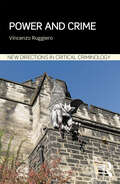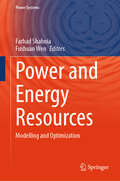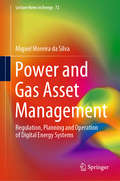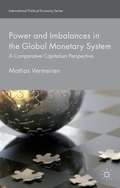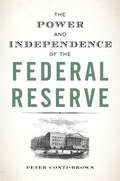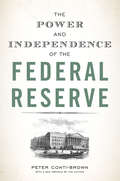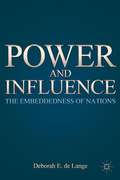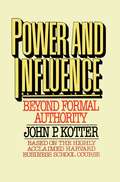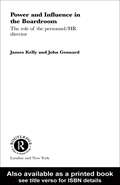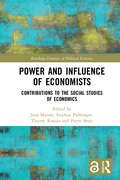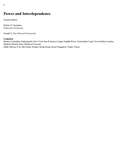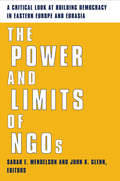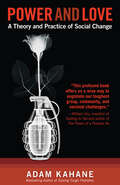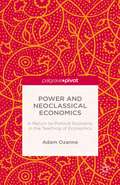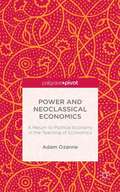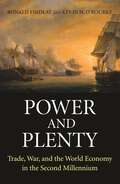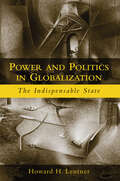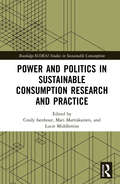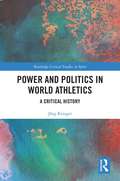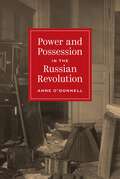- Table View
- List View
Power and Crime (New Directions in Critical Criminology)
by Vincenzo RuggieroThis book provides an analysis of the two concepts of power and crime and posits that criminologists can learn more about these concepts by incorporating ideas from disciplines outside of criminology. Although arguably a 'rendezvous' discipline, Vincenzo Ruggiero argues that criminology can gain much insight from other fields such as the political sciences, ethics, social theory, critical legal studies, economic theory, and classical literature. In this book Ruggiero offers an authoritative synthesis of a range of intellectual conceptions of crime and power, drawing on the works and theories of classical, as well as contemporary thinkers, in the above fields of knowledge, arguing that criminology can ‘humbly’ renounce claims to intellectual independence and adopt notions and perspectives from other disciplines. The theories presented locate the crimes of the powerful in different disciplinary contexts and make the book essential reading for academics and students involved in the study of criminology, sociology, law, politics and philosophy.
Power and Energy Resources: Modelling and Optimization (Power Systems)
by Farhad Shahnia Fushuan WenThis book highlights recent research advancements in the area of power and energy systems. Electrical networks all around the world are experiencing the integration of various types of energy resources including energy storage systems, and these systems are forming the future of power generation and delivery systems. There has been significant research interest in this area over the past decade. Proper designing, planning and operating such systems are crucial and the key area of interest for researchers and utilities. The key emphasis of this book is on modeling, analysis, optimization and management aspects of different types of power and energy systems and assets within electrical power networks. Interesting topics such as their planning, operation and technology accommodation are also presented in detail. The chapters introduce existing and new modeling approaches, optimization, control and management methods.
Power and Gas Asset Management: Regulation, Planning and Operation of Digital Energy Systems (Lecture Notes in Energy #72)
by Miguel Moreira da SilvaThis book offers meaningful insights into an impending challenge for the energy industry, namely the increasing role of asset management amongst the utilities’ core operations. In the aftermath of energy digitalization, power and gas companies will be able to seize asset productivity—through risk-based operation and maintenance—and better balance capital and operational expenditures. By addressing the asset management of both power and gas infrastructures, and by adopting a comprehensive approach—including regulation and business models, as well as a solid technology background—this book offers a unique perspective on the energy utilities’ transformation journey and the road to optimal decision-making for both asset portfolio expansion and replacement. The asset management end-to-end mission requires appropriate internal governance—depending on the business framework—and the development of decision aid models (for asset replacement and maintenance), supported on probabilistic risk and reliability indexes. This book advocates systematically digitalizing the power and gas assets, addressing both data governance and infrastructure, alongside real-time equipment condition monitoring. It also provides a meaningful methodology for designing data-centric asset management and predictive operation and maintenance, using artificial intelligence and engineering-based approaches. As such, it provides valuable strategy, methods and models—illustrated by case studies and proofs of concept—for a wide range of stakeholders, including utilities and industry professionals, regulators, policy-makers, researchers and students.
Power and Global Economic Institutions
by Ayse KayaWhat is the relationship between states' economic power and their formal political power in multilateral economic institutions? Why do we see variation in states' formal political power across economic institutions of the same era? In this book, Ayse Kaya examines these crucial under-explored questions, drawing on multiple theoretical traditions within international relations to advance a new approach of 'adjusted power'. She explains how the economic shifts of our time, marked by the rise of Brazil, Russia, India, China and other emerging economies, have affected and will impact key multilateral economic institutions. Through detailed contemporary and historical analyses of the International Monetary Fund, the World Bank, the G20, and the International Trade Organization, Kaya shows that the institutional setting mediates the significance of the underlying distribution of economic power across states. The book presents both case studies and key statistics.
Power and Imbalances in the Global Monetary System
by Mattias VermeirenThe author examines the indirect macroeconomic roots of the global financial crisis and Eurozone debt crisis: the escalation of global trade imbalances between the US and China and regional trade imbalances in the Eurozone. He provides new insights into the sources and dynamics of power and instability in the contemporary global monetary system
The Power and Independence of the Federal Reserve
by Peter Conti-BrownThe independence of the Federal Reserve is considered a cornerstone of its identity, crucial for keeping monetary policy decisions free of electoral politics. But do we really understand what is meant by "Federal Reserve independence"? Using scores of examples from the Fed's rich history, The Power and Independence of the Federal Reserve shows that much common wisdom about the nation's central bank is inaccurate. Legal scholar and financial historian Peter Conti-Brown provides an in-depth look at the Fed's place in government, its internal governance structure, and its relationships to such individuals and groups as the president, Congress, economists, and bankers. Exploring how the Fed regulates the global economy and handles its own internal politics, and how the law does--and does not--define the Fed's power, Conti-Brown captures and clarifies the central bank's defining complexities. He examines the foundations of the Federal Reserve Act of 1913, which established a system of central banks, and the ways that subsequent generations have redefined the organization. Challenging the notion that the Fed Chair controls the organization as an all-powerful technocrat, he explains how institutions and individuals--within and outside of government--shape Fed policy. Conti-Brown demonstrates that the evolving mission of the Fed--including systemic risk regulation, wider bank supervision, and as a guardian against inflation and deflation--requires a reevaluation of the very way the nation's central bank is structured. Investigating how the Fed influences and is influenced by ideologies, personalities, law, and history, The Power and Independence of the Federal Reserve offers a clear picture of this uniquely important institution.
The Power and Independence of the Federal Reserve
by Peter Conti-BrownThe independence of the Federal Reserve is considered a cornerstone of its identity, crucial for keeping monetary policy decisions free of electoral politics. But do we really understand what is meant by "Federal Reserve independence"? Using scores of examples from the Fed's rich history, The Power and Independence of the Federal Reserve shows that much common wisdom about the nation's central bank is inaccurate. Legal scholar and financial historian Peter Conti-Brown provides an in-depth look at the Fed's place in government, its internal governance structure, and its relationships to such individuals and groups as the president, Congress, economists, and bankers. Exploring how the Fed regulates the global economy and handles its own internal politics, and how the law does—and does not—define the Fed's power, Conti-Brown captures and clarifies the central bank's defining complexities. He examines the foundations of the Federal Reserve Act of 1913, which established a system of central banks, and the ways that subsequent generations have redefined the organization. Challenging the notion that the Fed Chair controls the organization as an all-powerful technocrat, he explains how institutions and individuals—within and outside of government—shape Fed policy. Conti-Brown demonstrates that the evolving mission of the Fed—including systemic risk regulation, wider bank supervision, and as a guardian against inflation and deflation—requires a reevaluation of the very way the nation's central bank is structured. Investigating how the Fed influences and is influenced by ideologies, personalities, law, and history, The Power and Independence of the Federal Reserve offers a uniquely clear and timely picture of one of the most important institutions in the United States and the world.
Power and Influence
by Deborah E. De LangeThis book investigates whether and why social structure influences cooperative organizational strategic decision making in an international relations context. It looks in particular at the United Nations General Assembly (UNGA).
Power and Influence: Beyond Formal Authority
by John P. KotterIn today's complex work world, things no longer get done simply because someone issues an order and someone else follows it.Most of us work in socially intricate organizations where we need the help not only of subordinates but of colleagues, superiors, and outsiders to accomplish our goals. This often leaves us in a "power gap" because we must depend on people over whom we have little or no explicit control.This is a book about how to bridge that gap: how to exercise the power and influence you need to get things done through others when your responsibilities exceed your formal authority.Full of original ideas and expert insights about how organizations-and the people in them-function, Power and Influence goes further, demonstrating that lower-level personnel also need strong leadership skills and interpersonal know-how to perform well.Kotter shows how you can develop sufficient resources of "unofficial" power and influence to achieve goals, steer clear of conflicts, foster creative team behavior, and gain the cooperation and support you need from subordinates, coworkers, superiors-even people outside your department or organization.He also shows how you can avoid the twin traps of naivete and cynicism when dealing with power relationships, and how to use your power without abusing it.Power and Influence is essential for top managers who need to overcome the infighting, foot-dragging, and politicking that can destroy both morale and profits; for middle managers who don't want their careers sidetracked by unproductive power struggles; for professionals hindered by bureaucratic obstacles and deadline delays; and for staff workers who have to "manage the boss."This is not a book for those who want to "grab" power for their own ends. But if you'd like to create smooth, responsive working relationships and increase your personal effectiveness on the job, Kotter can show you how-and make the dynamics of power work for you instead of against you.
Power and Influence: Achieving Your Objectives in Organizations
by Elizabeth Long Lingo Kathleen L. McginnPower is the potential to mobilize energy. This rather neutral definition does not address the issues of how to exercise power or to what ends. The answers to these questions determine the ultimate value of an individual's power. This note is written to help readers analyze the social system in which their power exists and their influence will be used. Following the guidelines presented, a careful analysis of the social system in which an individual operates, and an assessment of that individual's desires and objectives within the social system, may help maximize the development of power and the effective use of influence.
Power and Influence in the Boardroom: The Role Of The Personnel/hr Director (Routledge Advances in Management and Business Studies #Vol. 18)
by James Kelly John GennardIn the last decade there has been an increasing interest in the role of people management in formulating key business decisions. This book offers a counterbalance to the predominant view that Human Resource and Personnel managers have little influence in the strategy making process.The book offers guidance to Personnel / HR managers aspiring to raise their status in organisations, as well as an indication of the future development of the role of people management at the highest levels of business. It will be essential reading for all those with a professional or academic interest in Human Resource Management and employment relations.
Power and Influence of Economists: Contributions to the Social Studies of Economics (Routledge Frontiers of Political Economy)
by Jens Maesse; Stephan Pühringer; Thierry Rossier; Pierre BenzEconomists occupy leading positions in many different sectors including central and private banks, multinational corporations, the state and the media, as well as serving as policy consultants on everything from health to the environment and security. Power and Influence of Economists explores the interconnected relationship between power, knowledge and influence which has led economics to be both a source and beneficiary of widespread power and influence. The contributors to this book explore the complex and diverse methods and channels that economists have used to exert and expand their influence from different disciplinary and national perspectives. Four different analytical views on the role of power and economics are taken: first, the role of economic expert discourses as power devices for the formation of influential expertise; second, the logics and modalities of governmentality that produce power/knowledge apparatuses between science and society; third, economists as involved in networks between academia, politics and the media; and forth, economics considered as a social field, including questions of legitimacy and unequal relations between economists based on the detention of various capitals. The volume includes case studies on a variety of national configurations of economics, such as the US, Germany, Italy, Switzerland, Greece, Mexico and Brazil, as well as international spaces and organisations such as the IMF. This book provides innovative research perspectives for students and scholars of heterodox economics, cultural political economy, sociology of professions, network studies, and the social studies of power, discourse and knowledge.
Power And Interdependence
by Robert Keohane Joseph NyeA landmark work of international relations theory, Power and Interdependence first published in 1977 and posited a radically comprehensive explanation of the mechanics driving world affairs–“power politics” on one hand and “complex interdependence” on the other hand. This widely influential book reexamined the military and economic interests of state and non-state actors, and in an argument made before the end of the Cold War, the authors broadened the prevailing realist worldview of the time and anticipated many of the developments in our modern era of globalization. With a new preface by the authors and a foreword by Fareed Zakaria that looks at world affairs after the Cold War, the terrorist attacks of September 11, and the global financial crisis, Power and Interdependence is required reading for all students of international relations.
Power and Leadership
by Joseph S. Nye Jr.In this chapter, Joseph S. Nye, Jr., former dean of Harvard's Kennedy School, considers from a political science perspective the relationship between power and leadership, which he sees as inextricably intertwined. He characterizes power as having both a hard form (coercive) and a soft form (attractive), with each being exercised to some degree by nearly every leader. An effective leader will combine both forms, resulting in what Nye terms "smart power." The right proportions will vary, as will the amounts of hard and soft power available, based on a leader's context. Leaders, followers, and the contexts in which they interact are three key components of the social and power dynamics that define a leadership role. This chapter was originally published as Chapter 12 of "Handbook of Leadership Theory and Practice: A Harvard Business School Centennial Colloquium."
The Power and Limits of NGOs: A Critical Look at Building Democracy in Eastern Europe and Eurasia
by John Glenn Sarah MendelsonSince the end of the Cold War, a virtual army of nongovernmental organizations (NGOs) from the United States, Britain, Germany, and elsewhere in Europe have flocked to Central and Eastern Europe and Eurasia. These NGOs are working on such diverse tasks as helping to establish competitive political parties, elections, and independent media, as well as trying to reduce ethnic conflict.This important book is among the few efforts to assess the impact of these international efforts to build democratic institutions. The case studies presented here provide a portrait of the mechanisms by which ideas commonly associated with democratic states have evolved in formerly communist states, revealing conditions that help as well as hurt the process.
Power and Love: A Theory and Practice of Social Change
by Adam Kahane&“A profound book that offers us a wise way to negotiate our toughest group, community, and societal challenges.&” —William Ury, New York Times-bestselling coauthor of Getting to Yes To try to solve their toughest problems, people either push for what they want at all costs or try to completely avoid conflict. Adam Kahane argues that these two seemingly contradictory approaches are each a reflection of two distinct, fundamental drives: power, the single-minded desire to achieve one&’s solitary purpose; and love, the drive towards unity. They are inextricable parts of human nature, so to achieve lasting change you have to able to work fluidly with both. Kahane delves deeply in the dual nature of power and love, exploring their complex and intricate interplay. With disarming honesty he relates how, through trial and error, he learned to balance between them, shifting from one to the other as though learning to walk—at first falling, then stumbling forward, and finally moving purposefully toward true, lasting reconciliation and progress. For the last twenty years Kahane has worked around the world on a variety of challenges: economic development, food security, health care, judicial reform, peacemaking, climate change. He has worked with diverse teams of leaders—executives and politicians, generals and guerillas, civil servants and trade unionists, community activists and United Nations officials, clergy and artists. He has seen, up close and personal, examples of inspiring progress and terrifying regress. Power and Love reports what he has learned from these hard-won experiences.&“This exceptionally brave book pierces to the heart of how we must act in the world we so want to change.&” —Margaret J. Wheatley, bestselling author of Leadership and the New Science
Power and Neoclassical Economics: A Return to Political Economy in the Teaching of Economics
by A. OzanneMainstream economics almost completely ignores the role power plays in determining economic outcomes, which means it can only provide partial explanations of the distribution of wealth and income, and of the problems associated with inequality and poverty. For many, this is a fundamental failing that severely limits its relevance to the real world and is the source of much dissatisfaction with, and cynicism about, economics and economists. Ozanne explains how this neglect of power has come about over the past 150 years and why it is important. He reviews various definitions and theories of power from across the social sciences and proposes a new approach that could bring considerations of power back into standard economic theory and economics teaching. The approach is simple and intuitive, involving little more than re-envisioning the social welfare function as a 'political economy function'. However, if adopted in economics teaching, it could radically change the way young economists are taught to think about economic problems and lead to a 'return to political economy'.
Power and Neoclassical Economics: A Return to Political Economy in the Teaching of Economics
by Adam OzannePower and Neoclassical Economics.
Power and Plenty: Trade, War, and the World Economy in the Second Millennium (The Princeton Economic History of the Western World #30)
by Ronald Findlay Kevin H. O'RourkeInternational trade has shaped the modern world, yet until now no single book has been available for both economists and general readers that traces the history of the international economy from its earliest beginnings to the present day. Power and Plenty fills this gap, providing the first full account of world trade and development over the course of the last millennium. Ronald Findlay and Kevin O'Rourke examine the successive waves of globalization and "deglobalization" that have occurred during the past thousand years, looking closely at the technological and political causes behind these long-term trends. They show how the expansion and contraction of the world economy has been directly tied to the two-way interplay of trade and geopolitics, and how war and peace have been critical determinants of international trade over the very long run. The story they tell is sweeping in scope, one that links the emergence of the Western economies with economic and political developments throughout Eurasia centuries ago. Drawing extensively upon empirical evidence and informing their systematic analysis with insights from contemporary economic theory, Findlay and O'Rourke demonstrate the close interrelationships of trade and warfare, the mutual interdependence of the world's different regions, and the crucial role these factors have played in explaining modern economic growth. Power and Plenty is a must-read for anyone seeking to understand the origins of today's international economy, the forces that continue to shape it, and the economic and political challenges confronting policymakers in the twenty-first century.
Power and Politics in Globalization: The Indispensable State
by Howard H. LentnerFirst published in 2004. Routledge is an imprint of Taylor & Francis, an informa company.
Power and Politics in Sustainable Consumption Research and Practice (Routledge-SCORAI Studies in Sustainable Consumption)
by Cindy Isenhour Mari Martiskainen Lucie MiddlemissWith growing awareness of environmental deterioration, atmospheric pollution and resource depletion, the last several decades have brought increased attention and scrutiny to global consumption levels. However, there are significant and well documented limitations associated with current efforts to encourage more sustainable consumption patterns, ranging from informational and time constraints to the highly individualizing effect of market-based participation. This volume, featuring essays solicited from experts engaged in sustainable consumption research from around the world, presents empirical and theoretical illustrations of the various means through which politics and power influence (un)sustainable consumption practices, policies and perspectives. With chapters on compelling topics including collective action, behaviour-change and the transition movement, the authors discuss why current efforts have largely failed to meet environmental targets and explore promising directions for research, policy and practice. Featuring contributions that will help the reader open up politics and power in ways that are accessible and productive and bridge the gaps with current approaches to sustainable consumption, this book will be of great interest to students and scholars of sustainable consumption and the politics of sustainability.
Power and Politics in World Athletics: A Critical History (Routledge Critical Studies in Sport)
by Jörg KriegerThis book provides the first detailed history of one of the most powerful international sport organisations, the International Association of Athletics Federations (IAAF), since 2019 known as World Athletics. The book critically assesses the internal power relations within the IAAF by focusing on the IAAF leadership. Based on extensive archival research, Power and Politics in World Athletics offers a nuanced analysis of the institutionalised strategies that developed as a reflection of the IAAF’s interests and aims to create a broader understanding of the global sport system. With only six presidents in over a century of existence, the IAAF’s leaders had profound impacts on other international institutions, national stakeholders and sporting participants. Through four sections, the book identifies various key turning points in the history of the governing body of athletics, and explores the IAAF’s foundation, the policies of past IAAF presidents, and controversial issues such as doping, corruption and manipulation through a socio-historical lens. The book shows that while anyone could take part in athletics, policies enacted by each president served to ostracize those groups who did not fit into the IAAF’s vision of an equal playing field. This book is essential reading for anyone with an interest in sport history, sport sociology, the politics of sport, sport management, sport governance, or international organisations.
Power and Possession in the Russian Revolution (Histories Of Economic Life Ser. #27)
by Professor Anne O'DonnellA history that reframes the Bolsheviks&’ unprecedented attempts to abolish private property after the revolutions of 1917 The revolutions of 1917 swept away not only Russia&’s governing authority but also the property order on which it stood. The upheaval sparked waves of dispossession that rapidly moved beyond the seizure of factories and farms from industrialists and landowners, envisioned by Bolshevik revolutionaries, to penetrate the bedrock of social life: the spaces where people lived. In Power and Possession in the Russian Revolution, Anne O&’Donnell reimagines the Bolsheviks&’ unprecedented effort to eradicate private property and to create a new political economy—socialism—to replace it.O&’Donnell&’s account captures the story of property in reverse, showing how the bonds connecting people to their things were broken and how new ways of knowing things, valuing them, and possessing them coalesced amid the political ferment and economic disarray of the Revolution. O&’Donnell reminds us that Russia&’s postrevolutionary confiscation of property, like many other episodes of mass dispossession in the twentieth century, largely escaped traditional forms of record keeping. She repairs this omission, drawing on sources that chronicle the lived experience of upheaval—popular petitions, apartment inspections, internal audits of revolutionary institutions, and records of the political police—to reconstruct an archive of dispossession. The result is an unusually intimate history of the Bolsheviks&’ attempts to conquer people and things.The Bolsheviks&’ reimagining of property not only changed peoples&’ lives and destinies, it formed the foundation of a new type of state—one that eschewed the defense of private property rights in favor of an enduring but enigmatic new domain: socialist state property.
Power and Privilege in Roman Society
by Duncan-Jones RichardHow far were appointments in the Roman Empire based on merit? Did experience matter? What difference did social rank make? This innovative study of the Principate examines the career outcomes of senators and knights by social category. Contrasting patterns emerge from a new database of senatorial careers. Although the highest appointments could reflect experience, a clear preference for the more aristocratic senators is also seen. Bias is visible even in the major army commands and in the most senior civilian posts nominally filled by ballot. In equestrian appointments, successes by the less experienced again suggest the power of social advantage. Senatorial recruitment gradually opened up to include many provincials but Italians still kept their hold on the higher social groupings. The book also considers the senatorial career more widely, while a final section examines slave careers and the phenomenon of voluntary slavery.
